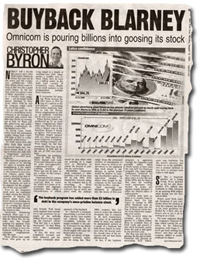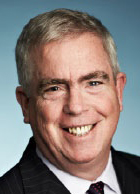Asking questions and not getting them acknowledged or answered is highly annoying and that’s just how the Senators felt who got snubbed by Lerner.
“The silent treatment outraged lawmakers,” said the New York Post.
Rep. Mike Turner (R-Ohio) snapped: “Ironically, Ms. Lerner invoked her constitutional rights about denying Americans their constitutional rights.”
IRS officials were able to vent their frustrations by relieving Lerner of her duties.
Reporters, who are running into lots of stonewalls these days, can’t “fire” stubborn story subjects or force them to answer questions by issuing subpoenas. The quality of public dialog has taken a big hit because of this and is one reason for the decline of traditional media.
Press is “Criminalized”
An editorial in the same issue of NYP by Michael Walsh had the headline, “The ‘Criminal’ Press.”
The Justice Department’s secret seizure of phone records of the AP and its monitoring of Fox News reporter James Rosen are “nothing less than thuggish attempts to criminalize the practice of journalism—the only professional specifically protected by the U.S. Constitution,” wrote Walsh.
An ally of the press is supposed to be the PR industry. It should spring to the defense of reporters mashed by government or business. Very few, if any, PR people are championing press freedom these days. Instead, Twitter, Facebook, etc., are being promoted as freedom “from” the press.
Do the “Right Thing,” Says Senay
|
|
Senay, CEO of FleishmanHillard, which is rebranding as “channel agnostic,” meaning using all forms of communication, and who is this year’s chair of the Council of PR Firms, said grads must have the “courage” to do the “right thing.” He told them to avoid “pack mentality” and exercise “critical thinking.”
For example, he said, “Would the banking crisis have occurred if more people exercised their critical thinking?”
Justaminute! The ones who failed to exercise critical thinking were the bankers themselves who gave large mortgages to anyone with a pulse and then dumped them on Fanny Mae and Freddie Mac.
Since Senay is so interested in “the right thing,” we asked him what was right about our being barred from the exhibit hall of the last two PRSA conferences and chased out of the Marriott lobby in San Francisco in 2012 by hotel security. Essentially we were accused of the crime of trespassing.
Senay, a member of the Society, says it’s not right to drag him into our dispute with the Society. But it is. Senay is a member and so are more than 30 FH employees. So far he is following the press-intolerant policies of Omnicom which have already infected OMC purchases Ketchum and Porter Novelli, turning press-friendly cultures into the opposite. Ketchum also has more than 30 Society members.
Gillette Loss Puts Spotlight on OMC
|
Wren |
This caused ad veteran Avi Dan (Saatchi & Saatchi, Euro RSCG) to say in a Forbes column that the takeover of ad agencies by the conglomerates has been “devastating.”
Human values have been squashed by bottom-line oriented financial buccaneers, he wrote. In previous times, owners would take the financial blows themselves, “hanging on to people until they won a new account.” Such an approach bred “loyalty, trust and stability,” he added.
Vast sums of money now wind up in the hands of admininstrators in secure jobs instead of the creators of adland’s product.
|
Weisenburger |
“Spinning Frenzy” Focused on Ketchum
OMC, although out of the limelight in recent years, has an uproarious past.
A Wall Street Journal front pager June 12, 2002 accused it of buying its earnings via acquisitions made with stock and borrowed money (73 in the previous two years) and withholding details of the purchases. Director Robert Callander had resigned after posing questions about Seneca, the off-balance sheet entity created for OMC’s 16 internet investments.
Reports of the WSJ piece had leaked out the week before, causing a slide in the stock. It crashed to $36.50 as of June 27 2002 from a high of $93 in mid-May.
Numerous potshots were taken at OMC including its alleged high pay to insiders, debt of $2.9 billion, and what Merrill Lynch called “a staggering” amount of options for insiders.
Financial commentator Jim Cramer in 2002 put OMC “at the top of his list of stocks to avoid,” saying he was fed up with OMC executives saying its critics don’t know what they are talking about.
The stock recovered, split, and in recent weeks has topped its 1999 high of $53.50 by reaching $63. It has taken more than ten years to win back Wall Street’s favor. The Street loves news of layoffs.
OMC/Ketchum Create Bad PR Press
OMC was the target of the New York Times’ page-plus Sunday, Feb. 14, 2005 feature, titled “Spinning Frenzy: PR’s Bad Press.” It was about broadcaster Armstrong Williams pushing the “No Child Left Behind” program while under a $240K contract with Ketchum.
Reporter Tim O’Brien got quotes from Dan and Richard Edelman, Howard Rubenstein, Harris Diamond of Weber Shandwick, Howard Paster of H&K, PRSA president Judy Phair and Lou Capozzi of MS&L.
Ducking were Wren, Weisenburger, Ketchum CEO Ray Kotcher and North American PR head Lorraine Thelian.
A Congressional Democrats’ study had found that Ketchum and three other OMC PR firms (not named in the article) won about $223 million of the $250M the government spent on PR contracts from 2001-2004.
Old Quote From PR Week
 The only OMC quote O’Brien was able to use was Thelian telling PR Week/U.S. in January that it was up to Armstrong to disclose the contract. Lacking input from OMC, O’Brien spent nearly half the article on a history of PR from Ivy Lee to the present.
The only OMC quote O’Brien was able to use was Thelian telling PR Week/U.S. in January that it was up to Armstrong to disclose the contract. Lacking input from OMC, O’Brien spent nearly half the article on a history of PR from Ivy Lee to the present.He concluded that Ketchum’s silence was “a risky tactic given that PR wisdom traditionally holds that staying quiet during a crisis only prolongs media scrutiny and creates an appearance of complicity.”
Christopher Byron, in an Aug. 14, 2006 New York Post article, headlined “Buyback Blarney,” accused OMC of a stock buyback program that bordered on “outright stock manipulation.” OMC borrowed nearly $1 billion to buy back its stock. No one from OMC would return his calls. He described Wren as being from a “Long Island family of working-class Irish immigrants who now lives on a hilltop estate in Greenwich.” He found only three press interviews by Wren in four years including two with a “friendly trade magazine” (AdWeek). Wren lived in Brooklyn before moving to Greenwich.
OMC Pulls Meeting From New York
Reporters for O’Dwyer’s, which has stock in OMC, had gone to the its annual meeting at 437 Madison ave. until 2003 when it was shifted out of town, never to return. It was in Los Angeles last year and Cincinnati this year.
Contact with anyone from OMC ceased as of that year. A lunch date had been set up with spokesperson Patricia Sloan around 2002 but she didn’t show up. No other lunch date was ever arranged. We never spoke to her again.
|
Trout |
New spokesperson is Joanne Trout, who was with MasterCard from 2005 to October 2012, lastly as a VP, external communications.
After receiving one e-mail from her saying she would talk to us Tuesday, May 30, she then e-mailed that she is “currently out of the office with limited access to e-mail and voice mail.”
She is the daughter of Jack Trout who, with Al Ries, co-authored in 1981 Positioning: The Battle for Your Mind, a marketing best-seller. Trout in 2009 authored Repositioning.
Joanne Trout’s Twitter entry describes her as a “PR geek, proud mom of three, very opinionated” and “someday will do an Ironman.”
There are 40 opinions on her Twitter site since Jan. 24 including those about social media, digital, importance of diversity, ads by Johnson & Johnson, gun control, big data, Superbowl ads, etc.
Maybe she will have an opinion on whether we should have been booted from the PRSA conference hotel last October.
Ketchum Was Friendliest PR Firm
This is a sad story to write because Ketchum for many years was about the friendliest PR firm.
Top executives Paul Alvarez and Dave Drobis hosted reporters at their golf (Siwanoy) and tennis (Tokeneke) clubs and entertained them regularly at lunches and dinners. Alvarez left in 1997 at the age of 55, less than a year after the firm’s purchase by OMC. The conglomerate paid $68 million for a firm that was $13 million in debt and was under threat of having its loans called by banks, according to SEC filings. Deloitte & Touche doubted its “ability to continue as a going concern,” saying it had suffered “significant losses” since 1992.
Ketchum’s ad side had just lost its biggest account, Acura of American Honda, billing $125 million. The purchase of Group PR in London in 1991 turned sour and resulted in a $4 million write-down in 1996. Ketchum sued the U.K. firm and two of it founders in 1993, saying they improperly took $240K from the treasury. It lost the suit and not only had to pay its own legal expenses but $500K in legal bills of the defendants.
Alvarez told the New York Times on April 18, 1994 that the New York office was so weak that he called it “the Ketchum curse.”
Execs departing in 1993-94 had drained the company of $11.4M by having their stock bought back at $60 a share when book value was -$1.42. Staff continued to pay themselves bonuses and get raises. Ketchum had no choice but to sell out. Drobis, president of the Arthur W. Page Society in 2004 and founding president of the Council of PR Firms, retired at 62 in 2004.
Ketchum Staffers Said They Were Shafted
Some members of the previous generation of Ketchum owners claimed they were shafted because they got far less than the $125 per share the current owners received. They were warned that if they didn't take less, attempts to sell out Ketchum might collapse and they would get nothing. Alvarez got $3.4M in OMC stock and Drobis, $2.2M.
None of the facts above were mentioned in a 90th anniversary story on Ketchum on this website May 22.
This reporter last year sought help from Rob Flaherty, CEO of Ketchum, in gaining admittance to the 2012 conference of the PR Society since he was co-chair. Calls and e-mails were not acknowledged.
Noticing that 56 staffers of Porter Novelli were on the daily e-mail blast of odwyerpr.com and PN had only one subscription, we called and e-mailed CEO Karen Van Bergen and assistant managing director Joe Russo two months ago in an attempt to sell the firm a site license. Neither one responded.
Bert Goss, CEO of H&K when we started covering PR in 1968, was asked the reason for the firm’s success. It represented nearly 500 clients at the time including many blue chips and was the unquestioned crown jewel of PR. Goss said, “All we’re talking about here is good will.” A company had to show its heart was in the right place. The rest would follow.






 The techniques deployed by OJ Simpson's defense team in the 'trial of the century' served as a harbinger for those used by Donald Trump... People worry about the politicization of medical science just as much as they fret about another pandemic, according to Edelman Trust Barometer... Book bans aren't restricted to red states as deep blue Illinois, Connecticut and Maryland challenged at least 100 titles in 2023.
The techniques deployed by OJ Simpson's defense team in the 'trial of the century' served as a harbinger for those used by Donald Trump... People worry about the politicization of medical science just as much as they fret about another pandemic, according to Edelman Trust Barometer... Book bans aren't restricted to red states as deep blue Illinois, Connecticut and Maryland challenged at least 100 titles in 2023. The NBA, which promotes legalized gambling 24/7, seems more than hypocritical for banning player for placing bets... Diocese of Brooklyn promises to issue press release the next time one of its priests is charged with sexual abuse... Truth Social aspires to be one of Donald Trump's iconic American brands, just like Trump University or Trump Steaks or Trump Ice Cubes.
The NBA, which promotes legalized gambling 24/7, seems more than hypocritical for banning player for placing bets... Diocese of Brooklyn promises to issue press release the next time one of its priests is charged with sexual abuse... Truth Social aspires to be one of Donald Trump's iconic American brands, just like Trump University or Trump Steaks or Trump Ice Cubes. Publicis Groupe CEO Arthur Sadoun puts competition on notice... Macy's throws in the towel as it appoints two directors nominated by its unwanted suitor... The Profile in Wimpery Award goes to the Ford Presidential Foundation for stiffing American hero and former Wyoming Congresswoman Liz Cheney.
Publicis Groupe CEO Arthur Sadoun puts competition on notice... Macy's throws in the towel as it appoints two directors nominated by its unwanted suitor... The Profile in Wimpery Award goes to the Ford Presidential Foundation for stiffing American hero and former Wyoming Congresswoman Liz Cheney. JPMorgan Chase chief Jamie Dimon's "letter to shareholders" is a must-read for PR people and others interested in fixing America and living up to its potential... Get ready for the PPE shortage when the next pandemic hits... Nixing Netanyahu. Gaza carnage turns US opinion against Israel's prime minister.
JPMorgan Chase chief Jamie Dimon's "letter to shareholders" is a must-read for PR people and others interested in fixing America and living up to its potential... Get ready for the PPE shortage when the next pandemic hits... Nixing Netanyahu. Gaza carnage turns US opinion against Israel's prime minister. Trump Media & Technology Group sees Elon Musk's X as an option for those who want the free expression promised by Truth Social but without Donald Trump, owner of 57.3 percent of TMTG... Chalk one up for "anti-woke warrior" governor Greg Abbott as University of Texas lays off 60 DEI-related staffers... Five percent of Americans see the US as its own worst enemy, according to Gallup.
Trump Media & Technology Group sees Elon Musk's X as an option for those who want the free expression promised by Truth Social but without Donald Trump, owner of 57.3 percent of TMTG... Chalk one up for "anti-woke warrior" governor Greg Abbott as University of Texas lays off 60 DEI-related staffers... Five percent of Americans see the US as its own worst enemy, according to Gallup.


 Have a comment? Send it to
Have a comment? Send it to 
No comments have been submitted for this story yet.